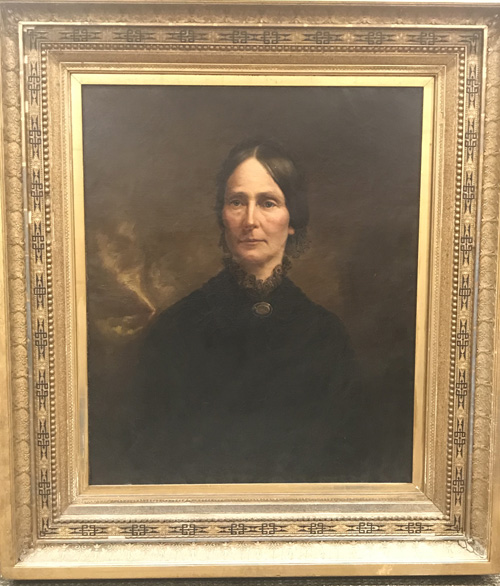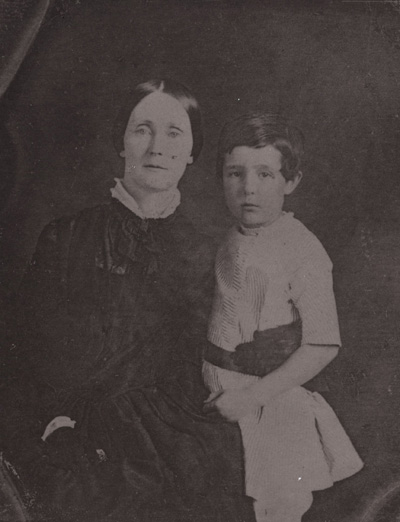Elizabeth “Aunt Lizzie” Sherman Hoar Returns to Concord
The Concord Free Public Library 's Special Collections Department recently received a gift of a beautiful painting of Elizabeth Sherman Hoar (1814-1878) from the Brooks Hoar family. We are delighted to share an image of the portrait with you here (see picture below, top) as well as a photograph of Elizabeth and child (see picture below, bottom) from an Emerson family photograph album in Special Collections.
Elizabeth Sherman Hoar, daughter of lawyer Samuel Hoar and Sarah Sherman, was born on July 14, 1814. An 1830 graduate of old Concord Academy, and schoolmate of Henry David Thoreau and his siblings, she was an intellectual and a scholar. She was the sister of Ebenezer Rockwood Hoar (lawyer, judge, Massachusetts senator, Attorney General of the United States in the cabinet of President Ulysses S. Grant, a representative in the United States Congress); of George Frisbie Hoar (lawyer and representative and senator in Congress); and Edward Sherman Hoar (Thoreau's friend and traveling companion). Her family's active political life introduced her to leading figures like Charles Sumner and Daniel Webster.
Elizabeth Hoar was also close to many with whom Ralph Waldo Emerson associated, including the Thoreaus, Channings, Alcotts, and Hawthornes. She was a friend of Elizabeth Palmer Peabody and Margaret Fuller, whose Boston Conversations series she attended.
In 1833, Charles Chauncy Emerson (1808-1836), Waldo's younger brother, a lawyer—and Elizabeth Hoar became engaged. Charles managed Samuel Hoar’s Concord law office while Squire Hoar served in Washington as a representative in Congress, beginning in 1835. The couple made plans to marry in September 1836. The Emersons renovated their home in anticipation of the newlyweds living with them. Tragically, Charles died in May 1836 from tuberculosis before they could wed.
Elizabeth's relationship with the Emersons continued, as she would be known as "Aunt Lizzie" by Waldo and Lidian Emerson’s children. She was a member of the Transcendental circle, preparing copy for The Dial and assisting Sophia Thoreau and Ellery Channing in collecting Henry David Thoreau’s posthumous works.
Emerson expressed the profound respect he felt for Elizabeth Hoar many times—for example, in a letter he wrote her on November 23, 1839: “Where is my letter to which I give you fair challenge? You are a sovereign woman & shall do as you choose, but in some hour of benevolence, you may remember those who are bound in the bonds of analyzing the Age. I do not wish to know the opinions of celeb[ra]ted reformers or celebrated conversers, or indeed of celebrated leaders of either sex. They are all officers & through their lips I hear always Mr Million speak. But you are queen of yourself & in your privacy & detachment possess a superiority to which we must all defer. Always I gladly hear what you say as the sentence of an intelligent umpire, and, so pedantic are my habits, should gladlier read what you write.”


